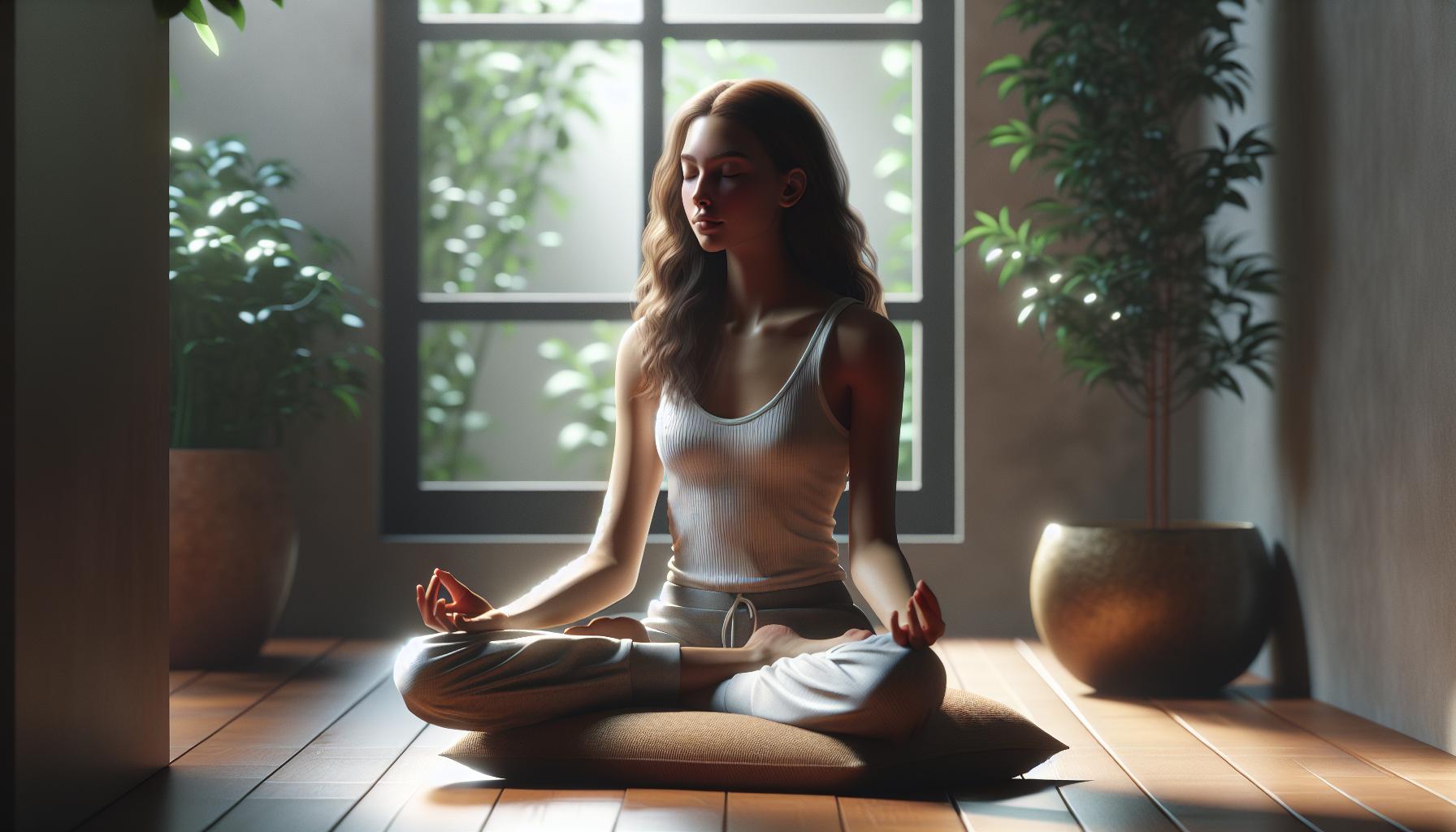Natural Stress Relief: Effective Ways to Reduce Anxiety Without Medication
Imagine you’re unwrapping a secret, much like a beloved family recipe passed down through generations. That’s how I feel about sharing natural ways to ease stress and anxiety. It’s not just about finding relief; it’s about rediscovering a sense of peace without the need for medication. Each method is a leaf in an ancient book of wellness, waiting to be turned with a gentle touch.
In my cozy corner, with a steaming cup of tea beside me, I’ve explored countless ways to calm the mind and soothe the soul naturally. From the rhythmic breathing that mimics the ocean’s waves to the grounding embrace of a morning walk in dew-kissed grass, these practices are treasures I’ve gathered in my journey. They’re simple, accessible, and most importantly, woven into the very fabric of daily life. Let’s embark on this path together, uncovering the quiet joy of natural tranquility.
Understanding Stress and Anxiety
As we delve deeper into the journey of finding peace naturally, it’s important to understand the underlying mechanics of what we’re dealing with: stress and anxiety. Let’s unwrap these concepts like hidden treasures, revealing how our bodies and minds react and why it matters in our day-to-day lives.
The Science Behind Stress
Stress isn’t just a buzzword; it’s a physical response. When I encounter a challenge or threat, my body kicks into “fight or flight” mode, releasing hormones like adrenaline and cortisol. These hormone surges increase my heart rate and prepare my body to respond to danger. This reaction is helpful in short bursts for say, dodging a stray soccer ball or sprinting to catch a bus, but when it fires nonstop? That’s not so fun. Prolonged stress can wreak havoc, dampening my immune system and making me more susceptible to illnesses. Understanding this helps me recognize the importance of managing stress—not just for my mental health, but for my physical health too.
The Impact of Anxiety on Daily Life
Anxiety, the sneaky cousin of stress, can be trickier to pin down. It often shows up as persistent worry or fear that doesn’t match the actual threat level. Imagine feeling on edge just sitting in my living room, worrying over a sound that turns out to be the dishwasher. Anxiety can morph everyday situations into overwhelming ordeals, affecting abilities to concentrate, make decisions, and enjoy life’s moments. Social interactions? Exhausting. Sleep patterns? Disrupted. It can even influence physical health, leading to muscle tension or a nagging headache. By acknowledging the extensive reach of anxiety, I can better grasp why finding effective, natural coping strategies is crucial.
Embracing natural methods to manage these conditions isn’t just about feeling better; it’s about fundamentally improving my daily interactions and long-term health.
Natural Relaxation Techniques

After peeling back the layers of stress and anxiety, it’s clear that finding natural ways to relax is like rediscovering a forgotten melody that soothes the soul. Let’s dive into some techniques that are as easy as pie but effective enough to make a real difference.
Deep Breathing Exercises
Easing anxiety can sometimes be as simple as taking a deep breath. Seriously, it’s not just a cliché! Deep breathing exercises signal your brain to chill out and tell your body to follow suit. Here’s how you can make your breath a powerhouse of calm:
- Find Your Comfort Spot: Whether it’s a cozy armchair or a quiet park bench, the setting matters.
- Master the 4-7-8 Technique: Inhale for four seconds, hold that breath for seven, and exhale slowly for eight seconds. This isn’t just random numbers; it’s a rhythm that helps reduce anxiety.
- Repeat: Consistency is key. Turn this into a daily ritual, and watch the magic happen.
By making deep breathing part of your daily routine, you tune into a natural rhythm that wards off panic before it can even start.
Progressive Muscle Relaxation
If stress had a nemesis, it might just be progressive muscle relaxation (PMR). This technique turns you into an expert at spotting tension and then bidding it goodbye, muscle by muscle. Here’s your battle plan:
- Start at Your Toes: Tense each muscle group, starting from your toes and working your way up to your forehead. Hold the tension for about five seconds.
- Release and Relax: After the tension, comes the sweet release. Let go and feel the muscle relax. It’s like hitting a reset button on your body’s stress levels.
- Breathe Through It: Sync your breathing with the tensing and releasing phases to maximize relaxation.
Implementing PMR into your evening routine can turn your body into a stress-repelling machine. It’s not just effective; it’s a way to take control back from stress, showing it who’s the boss around here.
The Role of Diet in Managing Stress

Diving into the great pool of nutrition may just be the stress-buster we’ve been ignoring. I’ve found that tweaking my diet not only keeps my belly happy but also plays a massive role in controlling my stress levels. So grab a seat, and let’s munch our way through stress management!
Foods to Include
Ever thought a grocery list could be your secret weapon against stress? It turns out certain foods have a knack for mellowing us out. Foods rich in magnesium, like spinach and other leafy greens, are my go-to for calming nerves. Magnesium is like the body’s chill pill, helping reduce stress and anxiety.
Another superstar is omega-3 fatty acids, found aplenty in fish like salmon and sardines. These fatty acids boost brain health, making it easier for me to stay cool during tense times. If you’re not a fish fan, flaxseeds and walnuts are great plant-based omega-3 alternatives.
Let’s not forget about probiotics; these little gut-friendly bacteria, found in yogurt and kombucha, do wonders for mood regulation. A healthy gut often equals a happy mind, reducing stress indirectly. I also swear by dark chocolate (in moderation, of course) because it lowers cortisol—the notorious stress hormone. So yes, it’s totally okay to reach for that dark chocolate bar when you’re feeling on edge!
Foods to Avoid
Onto the buzzkills! Some foods can spike stress levels, and I’ve learned (often the hard way) to steer clear. High sugar snacks, tempting as they may be, cause a quick surge of energy followed by an even quicker crash. It’s a real rollercoaster for both mood and energy levels.
Caffeine is another sneaky stress-enhancer. While my morning cup of java perks me up, too much can make me jittery and amp up my anxiety. Moderation is key here. And who can forget alcohol? Sure, it seems like a good idea at happy hour, but alcohol actually acts as a depressant and can mess with your sleep, making stress worse the next day.
Processed foods are also on the no-go list. These are often high in trans fats and other nasties that can inflame your body and brain, leading to higher stress levels. I’ve noticed that cutting down on processed meals and opting for whole, unrefined foods makes a massive difference in my overall stress.
Physical Activity as a Natural Stress Reliever

Engaging in physical activity is like hitting a reset button for your mind and body. Let’s explore how moving your body can be your secret weapon against stress and anxiety.
Benefits of Regular Exercise
Regular exercise isn’t just good for fitting into those skinny jeans – it’s a powerhouse when it comes to slashing stress levels. When you get your heart rate up, your body releases endorphins, those feel-good chemicals that are nature’s built-in painkillers and mood lifters. Think of them as your body’s own brand of happy pills, minus the pharmacy.
Beyond the chemical high, regular physical activity helps stabilize and elevate your mood, sharpen your focus, and improve your sleep. Who doesn’t want to feel more zen and get better zzz’s, right? Also, getting sweaty can ramp up your energy levels and reduce fatigue, making you less likely to throw your phone at the wall after yet another frustrating conference call.
Types of Exercises for Anxiety Relief
Not all exercises are created equal when it comes to fighting anxiety. For some, the zen of yoga will do the trick, slowing down the mind and flexing the body. Yoga’s meditative focus on breathing aligns perfectly with anxiety management, pulling your mind away from worries and onto the mat.
For others, punching it out in a boxing session can be supremely cathartic, transforming anxiety into a physically tiring but emotionally energizing workout. Then, there’s the runner’s high from a brisk jog or a scenic hike, which can clear the mind as effectively as it works the legs.
Mindfulness and Meditation

In the quest for tranquility, mindfulness and meditation are like hitting the jackpot without even buying a lottery ticket. Let’s dive into how tuning into your own mind can throw stress and anxiety out the window.
Basics of Mindfulness Meditation
Mindfulness meditation isn’t just a trendy buzzword; it’s a legit tool for keeping your cool. It boils down to two main actions: staying present and observing your thoughts without judgment. The real kicker? You don’t need any fancy equipment—just your mind, a quiet spot, and maybe a comfy cushion.
Here’s the lowdown: mindfulness meditation focuses on breathing and awareness of the body and mind. It’s like being the CEO of your thoughts, choosing which ones get your attention. Clinical studies, like those published in JAMA Internal Medicine, show that it can reduce symptoms of anxiety significantly. Think of it as a mental gym where you flex the muscles of concentration and relaxation.
Practical Tips for Beginners
Alright, newbie, want to try mindfulness meditation without turning your life upside down? I’ve got your back with some straightforward, practical tips:
- Start Small: Even just five minutes a day can kick off your journey.
- Find Your Spot: Choose a quiet corner where you won’t be disturbed—this becomes your stress-free sanctuary.
- Embrace the Timer: Use your phone’s timer to keep track without clock-watching.
- Focus on Your Breathing: When in doubt, return to your breath. It’s like your home base in a game of tag.
- Be Kind to Your Wandering Mind: Don’t fret if your thoughts drift—guide them gently back, no scolding needed.
Just dive in. It’s like learning to swim; you’ve got to get wet. The more you practice, the more natural it becomes, turning what might seem like a chore into a refreshing daily retreat.
The Power of a Good Sleep Routine
Let’s dive into why hitting the hay in the right way can be your new best friend for batting away stress and anxiety. A solid sleep routine is like the hidden champion in the fight against those pesky worries and midnight overthinking sessions.
Tips for Better Sleep Hygiene
Getting a good night’s sleep starts with setting the stage properly. Here’s my cheat sheet for stepping up your sleep game:
- Keep it consistent: Try to go to bed and wake up at the same time every day—yes, even on weekends! This trains your body to expect downtime at specific hours.
- Create a bedtime ritual: Whether it’s sipping herbal tea or reading a chapter of a book, having a pre-sleep routine signals to your brain that it’s time to wind down.
- Optimize your environment: Make your bedroom a sleep sanctuary! Keep it cool, dark, and quiet. Invest in blackout curtains or a white noise machine if you’re in a noisy area.
- Limit screens before bed: Blue light from phones and tablets wakes up your brain. Try ditching the screens an hour before bed—I promise, those emails will still be there in the morning.
- Watch what you eat and drink: Avoid heavy meals, caffeine, and alcohol close to bedtime. They can mess with your zzz’s!
How Sleep Affects Anxiety Levels
Sleep isn’t just a time-out for your body—it’s prime time for your brain to process emotions. Poor sleep can leave the door wide open for anxiety to waltz in. Here’s the scoop:
- More sleep, less worry: Quality sleep can decrease the reactivity of the amygdala, your brain’s fear center. In other words, getting enough shut-eye helps keep your internal alarm system from going haywire over every little thing.
- REM to the rescue: Rapid Eye Movement (REM) sleep, which is like a nightly deep-clean for your brain, helps process emotional information. When you shortchange yourself on sleep, you might find yourself more emotionally brittle.
- Stress and sleep are frenemies: High stress can make it hard to fall asleep, and not sleeping enough increases stress. Break the cycle by focusing on quality sleep to help manage anxiety levels.
Creating a Supportive Environment
Creating a supportive environment means tailoring the world around you to foster less stress and more smiles. Let’s dive into how social spaces and personal havens can transform your daily vibe.
Building a Positive Social Network
It’s not rocket science—hanging out with supportive, positive people can seriously upgrade your mental health. Think of your social circle as your personal cheer squad. Surrounding myself with folks who uplift me instead of dragging me down was a game-changer. It’s like having a live Spotify playlist of good vibes on constant replay!
Start by reaching out to old pals who made you laugh until you cried, or join groups that align with your hobbies. Whether it’s a book club, a gardening group, or an ultimate frisbee team, connecting with people who share your interests naturally decreases stress levels. Also, don’t underestimate the power of helping others—it boosts your mood big time. Volunteering can open you up to networks of people who are looking to give back and grow, just like you.
Importance of Personal Space
Your home should be your sanctuary, not a source of stress. Personalizing my space greatly helped in making me feel calmer and more secure. Start by decluttering—less mess means less stress, right? Then, introduce elements that soothe you. For me, it’s all about soft lighting, plenty of plant friends, and photos of happy memories.
Think about what energizes you at home. Is it blasting your favorite tunes, reading in a cozy corner, or whipping up a storm in the kitchen? Make space for these activities. Color can also play a crucial role. Shades of blue and green usually spell calm, while vibrant yellows and oranges can boost your spirits.
Moreover, if you work from home, maintaining a designated space for work can help keep the stress of work separate from your personal relaxation zones. My mantra? When you step into your home, you should feel like you’re stepping into a calm retreat, tailored just for you.
Conclusion
I hope you’ve found these insights on natural ways to reduce stress and anxiety helpful. Embracing these strategies can truly transform your daily life, offering a sense of peace and improved well-being without the need for medication. Whether it’s through mindful meditation, a nourishing diet, or engaging in physical activity, each step you take is a move towards a healthier, more serene you. Remember, it’s about finding what resonates with your lifestyle and making small, manageable changes. Here’s to a calmer, more centered you!

